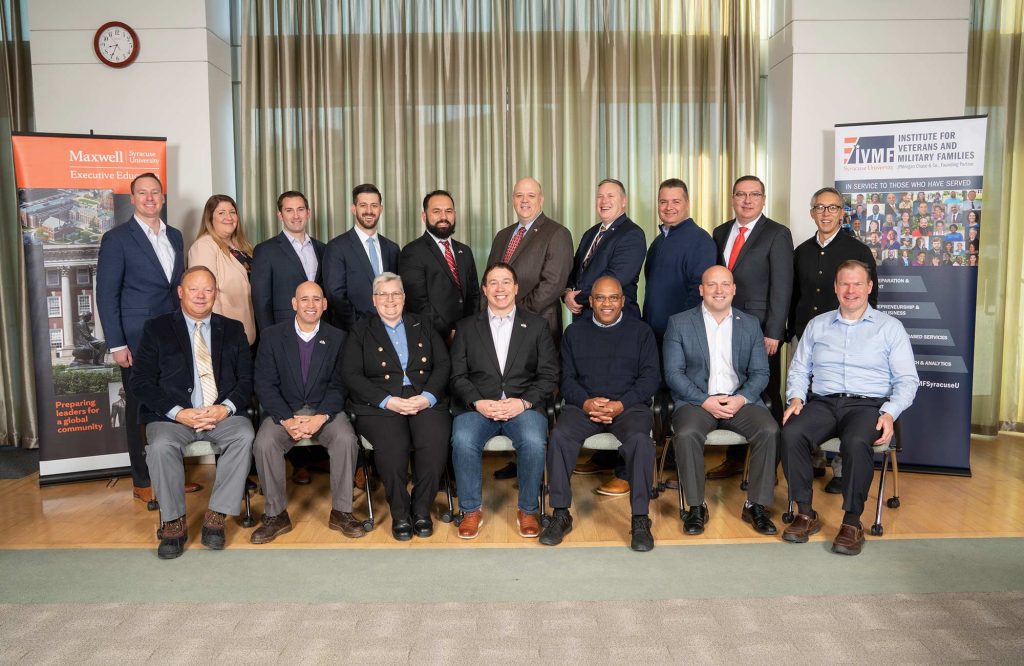Come January 3rd, 2025 when the 119th Congress is sworn in and begins its work, it will do so with one hundred veterans among its 535 members in the House and Senate. While this isn’t quite a historic number of veterans in Congress (there were 102 in 115th Congress in 2017), it does represent a nearly 25% increase over the 82 veterans of our previous congress.
The 100 veterans are expected to drop to 98 almost immediately, as Republican House Reps potentially leave for positions in the White House early next year. With their departures, veterans in Congress will include 72 Republicans and 26 Democrats.
To find out what this all means for veterans, we’ve reached out to Steven Lux, the Director of Maxwell School’s Executive Education Program. Steven and the Maxwell School works with IVMF to design, develop, and implement the Veterans Program in Politics and Civic Engagement (VPPCE), which teaches veterans how to run for office.
 So first, for our audience, can you introduce yourself and what your role is at IVMF?
So first, for our audience, can you introduce yourself and what your role is at IVMF?
Steven Lux: My Maxwell School colleagues and I – faculty and staff – work as collaborative partners with IVMF to design, develop and implement the Veterans Program in Politics and Civic Engagement.
Veterans will make up 18.7% of congress, but only make up 6.2% of the US population! What do you think makes veterans so electable, and what makes them such valuable assets to the public as congress members?
Steven Lux: Of course, every individual is different. But the typical veteran admitted to our program is an effusive patriot and committed public servant. They come to us already having sworn an oath to protect and defend our country and our constitution. They tend to be more independent-minded than the average American, less interested in partisan political interests, more disposed to consider what is best for the country.
Military service provides a unique opportunity to lead others, to manage crises, to think strategically, to complete missions in the face of adversity, and work with people of varied backgrounds and interests. Such things are invaluable assets in public office, where leadership is crucial for navigating complex political landscapes and making informed decisions. Given their mindset and their qualifications, it would be a waste not to encourage veterans to run for office and engage in civic life.
Should veterans or active-duty service members expect any legislation from this congress over the next two years to help them better access health care, mental health care, housing, or other benefits?
Steven Lux: I think there are reasons to be hopeful that there will be continual support for veterans and military quality-of-life issues during the 119th Congress since these have typically been bipartisan legislative areas. As an example, this week, Congress passed the NDAA for FY25, which included provisions related to troop pay increase, improving military housing, employment support for military spouses, expansion to access and capacity of child-care programs, etc.
Additionally, last month when IVMF was in DC for the Veterans Voices event hosted by The Hill, Sen. Moran (R-KS), who will be chairing the SVAC, indicated that his focus will be on implementation and oversight for some of these policies related to veteran healthcare access, mental healthcare, and more.
If a veteran wanted to pursue a career in politics, and maybe see themselves among the veteran members of congress, why should IVMF’s VPPCE Program be their first stop?
Steven Lux: We have spent the past five years experimenting with and improving our curriculum. What I like most about our approach is our metric for success. Foremost in our mind is providing veterans with the information they need to make good decisions about why they should or should not run for office. This is more important to us than the absolute number of persons who get elected. One of the principal means to share that information is bringing in veterans as session leads who have already run for office – won and lost – who have had careers in politics – short and long – and who represent a diversity of regions, backgrounds, level of office (local, state and federal), and branch of government (legislative, executive, judicial).
For those participants who decide they want to run, the next level program is designed to help them identify what type of office suits them best and what it takes to win an election. Our program is set within an academic institution that values in-depth study, research, and evidence-based learning. At the same time, everyone involved in this program understands VPPCE is built for the world practice. What participants appreciate most about the program is the balance of interactions they have with Syracuse University faculty and the many experienced, highly successful practitioners that have run for office, managed complex campaigns, raised money, use polling, leverage media to share their message, and knock on doors strategically.
When our graduates complete the program, each one of them will have a campaign plan they can put into practice.
Any final thoughts?
Steven Lux: We are motivated to do this work because we think all veterans deserve our collective support in transitioning to civilian life by it a career business, non-profits, government or politics. The reality is that not enough of us put ourselves into the political arena. If we can inspire hard working, highly skilled, civic minded veterans to run for office, win or lose, we are all better off for it.
Explore Your Career in Politics with VPPCE
The Veterans Program in Politics and Civic Engagement (VPPCE) is built to teach veterans what it takes to run for political office, and help them explore if it’s a viable option for them. This two-month online program culminates in a three-day in person immersion session at Syracuse University, and features a variety of veterans who have run for office sharing their experiences and laying out a pathway to make their political dreams reality. Learn more about the VPPCE program and get your application ready for this spring!

